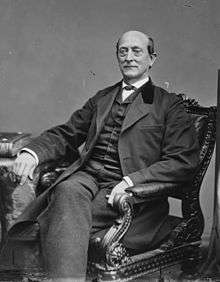William Brickly Stokes
William Brickly Stokes (September 9, 1814 – March 14, 1897) was an American politician and a member of the United States House of Representatives from Tennessee. He also served as colonel of the 5th Regiment Tennessee Volunteer Cavalry during the American Civil War.
William Brickly Stokes | |
|---|---|
 William Brickly Stokes | |
| Born | September 9, 1814 Chatham County, North Carolina |
| Died | March 14, 1897 (aged 82) Alexandria, Tennessee |
| Place of burial | Eastview Cemetery, Alexandria, Tennessee |
| Allegiance | United States of America Union |
| Service/ | United States Army Union Army |
| Years of service | 1862–1865 |
| Rank | |
| Commands held | 5th Tennessee Cavalry Regiment |
| Battles/wars | American Civil War |
Biography
He was born on September 9, 1814 in Chatham County, North Carolina. He attended the common schools, moved with his family to Temperance Hall, Tennessee, and engaged in agricultural pursuits. He was a member of the Tennessee House of Representatives from 1849 to 1852. He served in the Tennessee Senate in 1855 and 1856.
He was elected as a member of the Opposition Party to the Thirty-sixth Congress by Tennessee's 4th congressional district, serving from March 4, 1859 to March 4, 1861. He entered the Union Army on May 15, 1862 as a major of the Tennessee Volunteers. He served as colonel of the 5th Regiment Tennessee Volunteer Cavalry until he resigned on March 10, 1865.[1] He briefly served in temporary brigade command in the Army of the Ohio between June 17, 1863 and August 6, 1863.[1] On December 24, 1866, President Andrew Johnson nominated Stokes for the award of the honorary grade of brevet brigadier general to rank from March 13, 1865.[2] The U.S. Senate confirmed the award on February 21, 1867.[2] He studied law, was admitted to the bar in 1867, and commenced practice in Alexandria, Tennessee in DeKalb County, Tennessee.
Upon the readmission of Tennessee to representation, he was elected as an Unconditional Unionist to the Thirty-ninth Congress by Tennessee's 3rd congressional district. He was re-elected as a Republican to the Fortieth and Forty-first Congresses. He served in the U.S. House of Representatives from July 24, 1866 to March 4, 1871.[1] He was an unsuccessful candidate for re-election in 1870 to the Forty-second Congress. He also was the supervisor of internal revenue for Tennessee. He resumed the practice of law and died in Alexandria, Tennessee on March 14, 1897. He was interred in East View Cemetery at Alexandria.
Notes
- Eicher, John H., and David J. Eicher. Civil War High Commands. Stanford, CA: Stanford University Press, 2001. ISBN 0-8047-3641-3. p. 413
- Eicher, 2001, p. 758
See also
- List of American Civil War brevet Generals (Union)
References
- Eicher, John H., and David J. Eicher. Civil War High Commands. Stanford, CA: Stanford University Press, 2001. ISBN 0-8047-3641-3.
- United States Congress. "William Brickly Stokes (id: S000950)". Biographical Directory of the United States Congress. Retrieved on 2008-08-16'
External links
- "William Brickly Stokes". Find a Grave. Retrieved 2008-08-16.
| Party political offices | ||
|---|---|---|
| First | Radical Republican nominee for Governor of Tennessee 1869 |
Succeeded by None |
| U.S. House of Representatives | ||
| Preceded by John H. Savage |
Member of the U.S. House of Representatives from Tennessee's 4th congressional district March 4, 1859 - March 3, 1861 |
Succeeded by Andrew J. Clements |
| Preceded by Vacant |
Member of the U.S. House of Representatives from Tennessee's 3rd congressional district July 24, 1866 - March 3, 1871 |
Succeeded by Abraham E. Garrett |